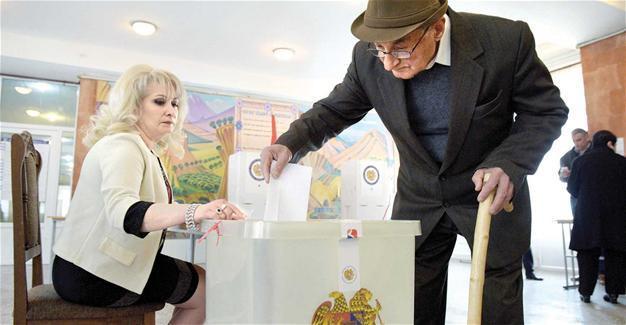Ruling party wins Armenian parliamentary vote
YEREVAN - Reuters

President Serzh Sarksyan’s ruling Republican Party won elections in Armenia on April 2, official results showed, laying the foundation for a new parliamentary system of government, while international observers said the voting was tainted.
The Republican Party of Armenia (RPA) had 49.12 percent of the votes while the opposition Tsarukyan Alliance led by wealthy businessman Gagik Tsarukyan gathered 27.32 percent.
The government-loyal Dashnaktsutyun Party had 6.57 percent and the opposition bloc Yelk (“Way Out”) 7.77 percent, enough for both to enter parliament.
Central Election Commission chairman Tigran Mukuchyan told the CEC meeting the figures were based on results from all 2,009 polling stations.
He said nothing about violations of election rules. The prosecutor’s office said it had been reviewing media reports of violations during the voting and count process.
The Organisation for Security and Co-operation in Europe (OSCE) on April 3 criticised Armenia’s weekend election, saying it had been tainted by instances of vote-buying and interference.
The OSCE said in a statement the parliamentary election had been well-administered and fundamental freedoms were generally respected. But it added that they had been marked by organizational problems and undue interference in the process, mostly by party representatives.
It also noted some pressure on civil servants as well as private sector employees.
Opposition parties said they had also filed complaints on irregularities to the prosecutor’s office, but gave no further details.
Republicans and Dashnaktsutyun, coalition partners in the current parliament, could create a coalition again, getting the right to name the future prime minister, who is expected to be the incumbent Karen Karapetyan.
The election was Armenia’s first under a new constitution, approved in a December 2015 referendum.
Parliament, rather than voters, will elect the president for the first time in 2018.
Sarksyan, 62, leader of the RPA and president since 2008, has repeatedly denied the constitutional changes were engineered to allow him to retain influence in the former Soviet republic after his final presidential term ends next year.
The new system reduces the presidency to a ceremonial post and increases the powers of the prime minister. Critics say Sarksyan could keep wielding executive power by becoming prime minister in 2018.
Many Armenians accuse the government of corruption and of mishandling the troubled economy.
Armenia depends heavily for aid and investment on Russia, which has been hard hit in the past three years by an economic downturn. Armenia has felt the impact, with growth falling to 0.2 percent last year from 3.0 percent in 2015.
 President Serzh Sarksyan’s ruling Republican Party won elections in Armenia on April 2, official results showed, laying the foundation for a new parliamentary system of government, while international observers said the voting was tainted.
President Serzh Sarksyan’s ruling Republican Party won elections in Armenia on April 2, official results showed, laying the foundation for a new parliamentary system of government, while international observers said the voting was tainted.